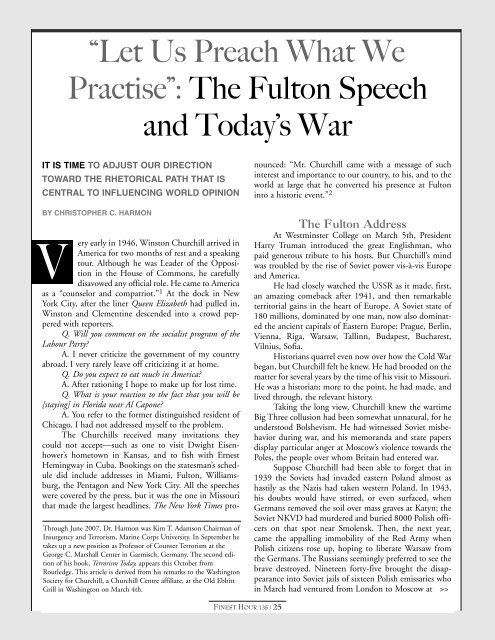Create successful ePaper yourself
Turn your PDF publications into a flip-book with our unique Google optimized e-Paper software.
“Let Us Preach What WePractise”: The Fulton Speechand Today’s WarIT IS TIME TO ADJUST OUR DIRECTIONTOWARD THE RHETORICAL PATH THAT ISCENTRAL TO INFLUENCING WORLD OPINIONBY CHRISTOPHER C. HARMONThrough June 2007, Dr. Harmon was Kim T. Adamson Chairman ofInsurgency and Terrorism, Marine Corps University. In September hetakes up a new position as Professor of Counter Terrorism at theGeorge C. Marshall Center in Garmisch, Germany. The second editionof his book, Terrorism Today, appears this October fromRoutledge. This article is derived from his remarks to the WashingtonSociety for <strong>Churchill</strong>, a <strong>Churchill</strong> Centre affiliate, at the Old EbbittGrill in Washington on March 4th.Very early in 1946, <strong>Winston</strong> <strong>Churchill</strong> arrived inAmerica for two months of rest and a speakingtour. Although he was Leader of the Oppositionin the House of Commons, he carefullydisavowed any official role. He came to Americaas a “counselor and compatriot.” 1 At the dock in NewYork City, after the liner Queen Elizabeth had pulled in,<strong>Winston</strong> and Clementine descended into a crowd pepperedwith reporters.Q. Will you comment on the socialist program of theLabour Party?A. I never criticize the government of my countryabroad. I very rarely leave off criticizing it at home.Q. Do you expect to eat much in America?A. After rationing I hope to make up for lost time.Q. What is your reaction to the fact that you will be[staying] in Florida near Al Capone?A. You refer to the former distinguished resident ofChicago. I had not addressed myself to the problem.The <strong>Churchill</strong>s received many invitations theycould not accept—such as one to visit Dwight Eisenhower’shometown in Kansas, and to fish with ErnestHemingway in Cuba. Bookings on the statesman’s scheduledid include addresses in Miami, Fulton, Williamsburg,the Pentagon and New York City. All the speecheswere covered by the press, but it was the one in Missourithat made the largest headlines. The New York Times pronounced:“Mr. <strong>Churchill</strong> came with a message of suchinterest and importance to our country, to his, and to theworld at large that he converted his presence at Fultoninto a historic event.” 2The Fulton AddressAt Westminster College on March 5th, PresidentHarry Truman introduced the great Englishman, whopaid generous tribute to his hosts. But <strong>Churchill</strong>’s mindwas troubled by the rise of Soviet power vis-à-vis Europeand America.He had closely watched the USSR as it made, first,an amazing comeback after 1941, and then remarkableterritorial gains in the heart of Europe. A Soviet state of180 millions, dominated by one man, now also dominatedthe ancient capitals of Eastern Europe: Prague, Berlin,Vienna, Riga, Warsaw, Tallinn, Budapest, Bucharest,Vilnius, Sofia.Historians quarrel even now over how the Cold Warbegan, but <strong>Churchill</strong> felt he knew. He had brooded on thematter for several years by the time of his visit to Missouri.He was a historian; more to the point, he had made, andlived through, the relevant history.Taking the long view, <strong>Churchill</strong> knew the wartimeBig Three collusion had been somewhat unnatural, for heunderstood Bolshevism. He had witnessed Soviet misbehaviorduring war, and his memoranda and state papersdisplay particular anger at Moscow’s violence towards thePoles, the people over whom Britain had entered war.Suppose <strong>Churchill</strong> had been able to forget that in1939 the Soviets had invaded eastern Poland almost ashastily as the Nazis had taken western Poland. In 1943,his doubts would have stirred, or even surfaced, whenGermans removed the soil over mass graves at Katyn; theSoviet NKVD had murdered and buried 8000 Polish officerson that spot near Smolensk. Then, the next year,came the appalling immobility of the Red Army whenPolish citizens rose up, hoping to liberate Warsaw fromthe Germans. The Russians seemingly preferred to see thebrave destroyed. Nineteen forty-five brought the disappearanceinto Soviet jails of sixteen Polish emissaries whoin March had ventured from London to Moscow at >>FINEST HOUR 135 / 25

















